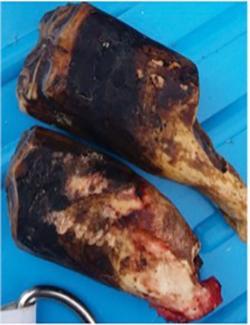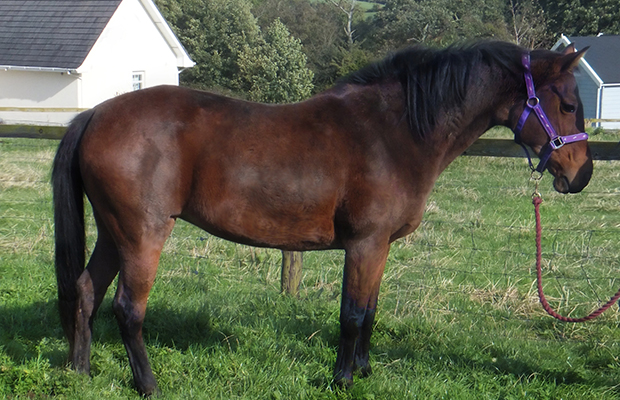Dean's Lunchtime Clinical Club - 3 October 2017 - Sinead Devine
Sinead Devine, Assistant Professor in Equine Clinical Studies, spoke about a dental case from the Equine Field Service involving a 'Mystery Jaw Lump.' The patient involved was Amber, a 24 year old anglo/arab mare who had a swelling on her right mandible for a number of months. Her owner reported weight loss during the winter, which was gained back in the summer, and advised that she had no dental work carried out in approx 4 years. A clinical exam showed that all parameters were within normal limits. The swelling on the mandible was a hard, 4cm, raised circular lesion extending from the ventral aspect of the body of the mandible, it felt bone like and relatively smooth, with no pain or heat. Amber's manure was of normal consistency.
As this was a teaching case, the students on the Equine Field Service at that time went through the differentials looking for a cause for weight loss and swelling. Sinead advised that the team worked on thinking it through with the students, considering a number of factors - dental problems were likely due to age, parasites were also likely but malnutrition was unlikely. It was noted that Amber had a minimal stress lifestyle. A routine physical exam was carried out and this was followed by standing sedation for an oral exam. The oral exam showed severe dental disease and significant wear on the teeth; the 408 tooth was removed by hand and the 409 tooth was extracted.
 Radiographs were taken which proved very useful in this case. As in previous cases discussed at the Clinical Club, Sinead outlined that this case was very much a team effort, involving discussions with surgeons and radiologists in the Hospital. Treatment was given on-site initially, with Amber prescribed an anti-inflammatory, antibiotics, pain management medication and a solution to flush the area. The Equine Field Service were to reassess the case in two weeks. Sinead outlined the benefits of working in a teaching hospital where there is a team to work with and assistance in carrying out research into similar cases.
Radiographs were taken which proved very useful in this case. As in previous cases discussed at the Clinical Club, Sinead outlined that this case was very much a team effort, involving discussions with surgeons and radiologists in the Hospital. Treatment was given on-site initially, with Amber prescribed an anti-inflammatory, antibiotics, pain management medication and a solution to flush the area. The Equine Field Service were to reassess the case in two weeks. Sinead outlined the benefits of working in a teaching hospital where there is a team to work with and assistance in carrying out research into similar cases.
Owner communication is critical in first opinion practice, and Sinead also highlighted the importance of follow-up in such cases. In Amber's case, she had loose manure after 4 days of treatment and her owner decided to discontinue the medication and start her on a course of probiotics. The Equine Field Service carried out a re-check on 31 August, and Amber was tested for Cushings at that time. Sinead raised the issue of owner influence in terms of financial decisions around treatment and also compliance with administering medications. The owner in this case had an interest in alternative therapies and made the decision to treat Cushings with Agnus Cactus. Sinead had received a phone update that day from the owner who reported that Amber was ‘joyful, kicking and bucking.’ Amber should now receive basic geriatric care and regular dental care and is scheduled for a re-check in December.
The use of alternative therapies was raised during the Q&A, and Sinead advised that in such cases you give people the evidence around the efficacy of such treatments but that it is also important to be understanding – this is critical when working with owners. Sinead highlighted that the use of herbal remedies is very common in equine practice and that this was a useful case for students to be exposed to.
